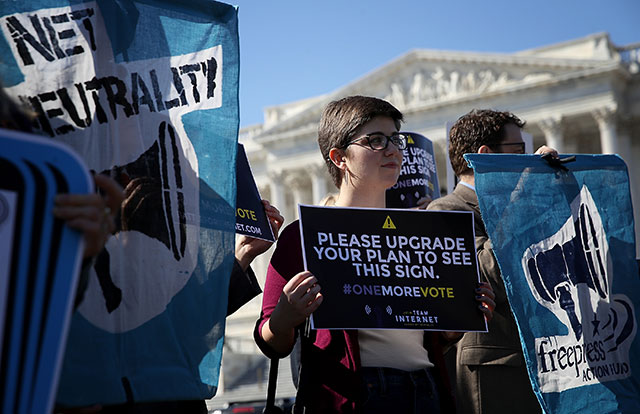
Today is the day that net neutrality’s “slow and insidious” death at the hands of the Republican-controlled FCC officially begins, and Congress is facing urgent pressure to save the open internet before it’s too late.
With Monday marking 60 days after the FCC’s net neutrality repeal entered the Federal Register, parts of the GOP-crafted plan — spearheaded by agency chair and former Verizon lawyer Ajit Pai — will now slowly begin taking effect, while some still need to be approved by the Office of Management and Budget.
Net neutrality backers in Congress, meanwhile, are still struggling to compile enough votes to repeal Pai’s new rules, despite the fact that they are deeply unpopular among the American public.
The Senate needs just one more vote to pass a Congressional Review Act (CRA) resolution to restore net neutrality protections before it can move to the House, where it would face an uphill battle. An official vote in the Senate has yet to be scheduled, but could come in the next few weeks.
In a recent Twitter thread, the advocacy group Fight for the Future warned against sensationalistic headlines proclaiming that net neutrality will immediately be gone on Monday, noting that large telecom companies will ensure that the open internet’s death is as quiet and subtle as possible in order to minimize public backlash.
“The ISPs aren’t going to immediately start blocking content or rolling out paid prioritization scams. They know Congress and the public are watching them,” the group noted. “And that’s the worst part. What will happen is over time ISP scams and abuses will become more commonplace and more accepted. They’ll roll out new schemes that appear good on their face but undermine the free market of ideas by allowing ISPs to pick winners and losers.”
The most important thing for EVERYONE to understand is that nothing catastrophic or dramatic is going to happen immediately when the FCC rules go into effect. Telecom shills will immediately start saying “See? The sky didn’t fall, we never needed #NetNeutrality.” They’re lying.
— Fight for the Future (@fightfortheftr) April 19, 2018
So: don’t fall for ISP lobbyists talking points. They’re ALREADY claiming that #NetNeutrality was never needed since the sky hasn’t fallen, and the rules haven’t even gone into effect. But also don’t panic. The Internet is not going to die next week. Keep calm and keep fighting.
— Fight for the Future (@fightfortheftr) April 19, 2018
The Senate will vote in a matter of weeks on a Congressional Review Act (CRA) resolution to block the FCC’s repeal. Now is the moment to get engaged.
Everyone: take action at https://t.co/xSJHbLq2Wn
Small businesses: sign this letter https://t.co/fto5TanXbn
Retweet & spread!
— Fight for the Future (@fightfortheftr) April 19, 2018
With net neutrality backers in Congress scrambling to rally enough votes to repeal Pai’s rules, states like Washington and California are moving ahead with ambitious plans to protect the open internet from telecom throttling and manipulation.
As Common Dreams reported last week, California legislation that has been hailed as the “gold standard” for net neutrality protections has passed out of the Energy, Utilities, and Communications Committee, despite a fervent effort by the telecom industry to tank the bill.
While advocacy groups have applauded state efforts to defend the open internet from Pai’s FCC, they have argued that the only way to ensure net neutrality protections nationwide is to restore them at the federal level.
In a recent series of tweets, Sen. Ed Markey (D-Mass.) — who introduced the resolution to bring back net neutrality safeguards shortly after the FCC voted to repeal them last December — urged Americans to pressure their lawmakers to act before Pai’s plan takes full effect.
With #OneMoreVote in the Senate, we can vote to reverse @realDonaldTrump’s attack on the internet. The House can do the same with 218 votes. It currently has 160.
But we won’t get those votes unless lawmakers hear from people who care about protecting the future of the internet.
— Ed Markey (@SenMarkey) April 20, 2018
“Momentum is on our side, but time isn’t. Help us save the internet by making your voices heard now,” Markey concluded. “Members of Congress need to know that there will be a price to pay for being on the wrong side of internet history.”
Join us in defending the truth before it’s too late
The future of independent journalism is uncertain, and the consequences of losing it are too grave to ignore. To ensure Truthout remains safe, strong, and free, we need to raise $46,000 in the next 7 days. Every dollar raised goes directly toward the costs of producing news you can trust.
Please give what you can — because by supporting us with a tax-deductible donation, you’re not just preserving a source of news, you’re helping to safeguard what’s left of our democracy.